英文109句型精简版
英语最常用的60个句型及例句
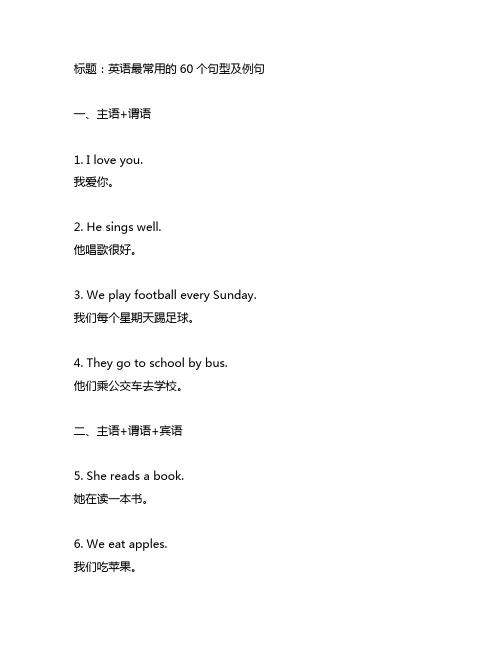
标题:英语最常用的60个句型及例句一、主语+谓语1. I love you.我爱你。
2. He sings well.他唱歌很好。
3. We play football every Sunday. 我们每个星期天踢足球。
4. They go to school by bus.他们乘公交车去学校。
二、主语+谓语+宾语5. She reads a book.她在读一本书。
6. We eat apples.我们吃苹果。
7. He speaks English.他讲英语。
8. They watch TV.他们看电视。
三、主语+谓语+宾语+宾语补足语9. She paints the wall red.她把墙刷成了红色。
10. We call him a hero.我们称他为英雄。
11. He considers the plan unfeasible. 他认为这个计划不可行。
12. They make their father proud.他们让父亲感到自豪。
四、主语+系动词+表语13. I am a teacher.我是一名老师。
14. She was happy.她很快乐。
15. He is my friend.他是我的朋友。
16. They are students.他们是学生。
五、主语+谓语+间宾+直宾17. She teaches us English. 她教我们英语。
18. He bought her a gift. 他给她买了一份礼物。
19. We tell him a story.我们给他讲故事。
20. They show us the way.他们给我们指路。
六、主语+谓语+宾补+宾语21. She made her sister cry.她让她妹妹哭了。
22. They found the problem solved. 他们发现问题已经解决了。
23. He heard the news spread.他听说了消息已经传开了。
英语万能句型大全
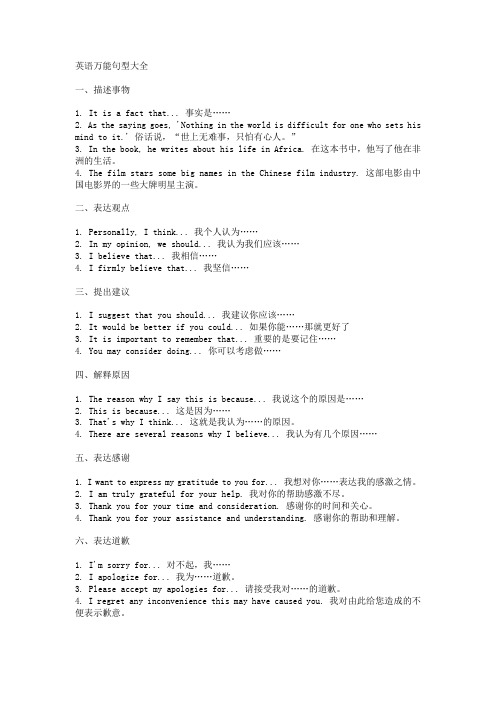
英语万能句型大全一、描述事物1. It is a fact that... 事实是……2. As the saying goes, 'Nothing in the world is difficult for one who sets his mind to it.' 俗话说,“世上无难事,只怕有心人。
”3. In the book, he writes about his life in Africa. 在这本书中,他写了他在非洲的生活。
4. The film stars some big names in the Chinese film industry. 这部电影由中国电影界的一些大牌明星主演。
二、表达观点1. Personally, I think... 我个人认为……2. In my opinion, we should... 我认为我们应该……3. I believe that... 我相信……4. I firmly believe that... 我坚信……三、提出建议1. I suggest that you should... 我建议你应该……2. It would be better if you could... 如果你能……那就更好了3. It is important to remember that... 重要的是要记住……4. You may consider doing... 你可以考虑做……四、解释原因1. The reason why I say this is because... 我说这个的原因是……2. This is because... 这是因为……3. That's why I think... 这就是我认为……的原因。
4. There are several reasons why I believe... 我认为有几个原因……五、表达感谢1. I want to express my gratitude to you for... 我想对你……表达我的感激之情。
常用英语口语绝佳句型100句
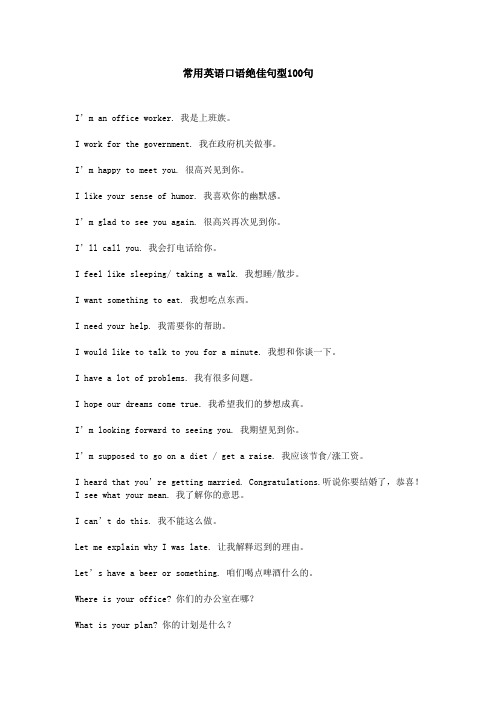
常用英语口语绝佳句型100句I’m an office worker. 我是上班族。
I work for the government. 我在政府机关做事。
I’m happy to meet you. 很高兴见到你。
I like your sense of humor. 我喜欢你的幽默感。
I’m glad to see you again. 很高兴再次见到你。
I’ll call you. 我会打电话给你。
I feel like sleeping/ taking a walk. 我想睡/散步。
I want something to eat. 我想吃点东西。
I need your help. 我需要你的帮助。
I would like to talk to you for a minute. 我想和你谈一下。
I have a lot of problems. 我有很多问题。
I hope our dreams come true. 我希望我们的梦想成真。
I’m looking forward to seeing you. 我期望见到你。
I’m supposed to go on a diet / get a raise. 我应该节食/涨工资。
I heard that you’re getting married. Congratulations.听说你要结婚了,恭喜!I see what your mean. 我了解你的意思。
I can’t do this. 我不能这么做。
Let me explain why I was late. 让我解释迟到的理由。
Let’s have a beer or something. 咱们喝点啤酒什么的。
Where is your office? 你们的办公室在哪?What is your plan? 你的计划是什么?When is the store closing? 这家店什么时候结束营业?Are you sure you can come by at nine? 你肯定你九点能来吗?Am I allowed to stay out past 10? 我可以十点过后再回家吗?The meeting was scheduled for two hours, but it is now over yet. 会议原定了两个小时,不过现在还没有结束。
84个英语基本句型

英语是一门广泛使用的语言,掌握基本句型可以帮助我们有效地表达自己的意思。
下面将介绍84个常用的英语基本句型,希望对大家学习英语有所帮助。
1. 主语 + 动词:I eat.2. 主语 + 动词 + 宾语:She reads books.3. 主语 + 不及物动词:They swim.4. 主语 + 系动词 + 表语:He is happy.5. 主语 + 动词 + 间接宾语 + 直接宾语:She gave me a gift.6. 主语 + 动词 + 宾语 + 宾语补足语:We consider him our friend.7. 主语 + 动词 + 间接宾语 + 直接宾语 + 宾语补足语:They made him their leader.8. 主语 + 动词 + 宾语 + 宾语补足语:He painted the wall red.9. 主语 + 动词 + 宾语 + 间接宾语:She told me a joke.10. 主语 + 不及物动词 + 表语:He became a doctor.11. 主语 + 不及物动词 + 宾语补足语:They elected him president.12. 主语 + 不及物动词 + 宾语 + 宾语补足语:She made him her assistant.13. 主语 + 系动词 + 宾语 + 宾语补足语:I find English interesting.14. 主语 + 系动词 + 表语 + 宾语:She called me a fool.15. 主语 + 系动词 + 宾语 + 宾语补足语:He made me his secretary.16. 主语 + 系动词 + 宾语 + 表语:They named the baby Adam.17. 主语 + 状语 + 动词:We ran quickly.18. 主语 + 状语 + 系动词 + 表语:He felt really tired.19. 主语 + 动词 + 状语:She sings beautifully.20. 主语 + 宾语 + 状语 + 动词:He won the game with great effort.21. 主语 + 宾语 + 状语 + 动词 + 宾语补足语:They elected her president with unanimous support.22. 主语 + 谓语 + 宾语 + 状语:We found the key under the bed.23. 主语 + 谓语 + 宾语 + 状语 + 宾语补足语:She named her daughter Lily out of love for flowers.24. 主语 + 谓语 + 不定式:They want to play.25. 主语 + 谓语 + 动词 + 不定式:He can swim.26. 主语 + 谓语 + 宾语 + 动词 + 不定式:She asked me to help.27. 主语 + 谓语 + 不定式 + 宾语补足语:We believe him to be honest.28. 主语 + 谓语 + 宾语 + 不定式 + 宾语补足语:He wants me to be his assistant.29. 主语 + 谓语 + 不定式 + 状语:You need to study hard.30. 主语 + 谓语 + 动名词:She enjoys swimming.31. 主语 + 谓语 + 宾语 + 动名词:They appreciate her singing.32. 主语 + 谓语 + 动名词 + 宾语补足语:I consider cooking an art.33. 主语 + 谓语 + 不定式 + 动名词:He started to learn painting.34. 主语 + 谓语 + 宾语 + 不定式 + 动名词:She saw him come in.35. 主语 + 谓语 + 宾语 + 不定式 + 状语:We made them stay longer.36. 主语 + 谓语 + 不定式 + 宾语补足语 + 动名词:He wants us to help him finish the project.37. 主语 + 谓语 + 不定式 + 宾语补足语 + 状语:I expect you to arrive on time.38. 主语 + 谓语 + 不定式 + 动名词 + 状语:They will try to solve the problem by working together.39. 主语 + 谓语 + 宾语 + 不定式 + 宾语补足语 + 状语:She persuaded him to stay after school for extra practice.40. 主语 + 谓语 + 分词:He looked tired.41. 主语 + 谓语 + 宾语 + 分词:They found the book interesting.42. 主语 + 谓语 + 分词 + 宾语补足语:We consider him qualified for the job.43. 主语 + 谓语 + 不定式 + 分词:She decided to leave quickly.44. 主语 + 谓语 + 宾语 + 不定式 + 分词:He heard her sing beautifully.45. 主语 + 谓语 + 分词 + 状语:They sat there, waiting for the bus.46. 主语 + 谓语 + 宾语 + 分词 + 状语:We saw her boarding the train.47. 主语 + 谓语 + 分词 + 宾语补足语 + 状语:He walked away, satisfied with his achievement.48. 主语 + 谓语 + 分词 + 不定式:She came running to me to ask a question.49. 主语 + 谓语 + 宾语 + 分词 + 不定式:They saw him standing alone in the rain.50. 主语 + 谓语 + 分词 + 宾语 + 不定式:We watched the movie, hoping to be entertained.51. 主语 + 谓语 + 不定式 + 分词 + 宾语补足语:He wants us to stay focused on our goals.52. 主语 + 谓语 + 不定式 + 分词 + 状语:She needs to finish her homework before going out.53. 主语 + 谓语 + 宾语 + 不定式 + 分词 + 状语:They made him work extra hours to meet the deadline.54. 主语 + 谓语 + 不定式 + 分词 + 宾语补足语:We believe you to have the ability to succeed.55. 主语 + 谓语 + 不定式 + 分词 + 宾语补足语 + 状语:He considered it a great honor to be chosen as the team captain.56. 主语 + 谓语 + 分词 + 状语 + 宾语:They finished the task, exhausted.57. 主语 + 谓语 + 宾语 + 分词 + 状语 + 宾语补足语:She found him standing there, helpless.58. 主语 + 谓语 + 分词 + 宾语 + 状语:He left the room, closing the door behind him.59. 主语 + 谓语 + 分词 + 宾语 + 宾语补足语:We saw her painting the wall red.60. 主语 + 谓语 + 宾语 + 分词 + 宾语补足语 + 状语:They heard him singing in the shower, beautifully.61. 主语 + 谓语 + 分词 + 不定式 + 状语:She stood there, not knowing what to say.62. 主语 + 谓语 + 宾语 + 分词 + 不定式 + 状语:He caught her reading his diary, secretly.63. 主语 + 谓语 + 分词 + 宾语 + 不定式 + 状语:They watched the kids playing happily in the park.64. 主语 + 谓语 + 不定式 + 分词 + 状语 + 宾语补足语:We want you to come prepared for the meeting.65. 主语 + 谓语 + 不定式 + 分词 + 宾语 + 状语:She asked me to stay quiet, not attracting attention.66. 主语 + 谓语 + 分词 + 状语 + 宾语 + 宾语补足语:They arrived at the party late, all dressed up.67. 主语 + 谓语 + 分词 + 宾语 + 状语 + 宾语补足语:I left the office, feeling satisfied with my performance.68. 主语 + 谓语 + 分词 + 宾语 + 宾语补足语 + 状语:He walked away, looking disappointed.69. 主语 + 谓语 + 不定式 + 宾语 + 分词:She wants us to keep the door closed, protecting the animals inside.70. 主语 + 谓语 + 不定式 + 状语 + 分词:They need to finish the project, no matter how hard it is.71. 主语 + 谓语 + 不定式 + 宾语 + 分词 + 状语:We would like you to come over for dinner, if you are available.72. 主语 + 谓语 + 不定式 + 分词 + 状语 + 宾语补足语:He decided to work harder, hoping to achieve better results.73. 主语 + 谓语 + 不定式 + 分词 + 宾语补足语 + 状语:She wanted him to leave, regardless of his apology.74. 主语 + 谓语 + 分词 + 宾语 + 不定式:They saw him running down the street to catch the bus.75. 主语 + 谓语 + 分词 + 不定式 + 宾语:He felt someone touch his shoulder, turning around to see who it was.76. 主语 + 谓语 + 分词 + 宾语 + 不定式 + 宾语补足语:She caught her sister eating her chocolate cake, scolding her for the theft.77. 主语 + 谓语 + 不定式 + 分词 + 宾语 + 状语:They asked me to speak louder, not being able to hear me clearly.78. 主语 + 谓语 + 不定式 + 分词 + 状语 + 宾语补足语:We advised him to approach the problem from a different angle, with the hope of finding a solution.79. 主语 + 谓语 + 不定式 + 宾语 + 分词 + 宾语补足语 + 状语:She reminded him to take his medicine, not forgetting his doctor's advice.80. 主语 + 谓语 + 不定式 + 分词 + 宾语 + 状语 + 宾语补足语:He urged them to apply for the position, fully aware of their qualifications. 81. 主语 + 谓语 + 分词 + 不定式 + 状语 + 宾语 + 宾语补足语:They watched the news report excitedly, hoping to see their favorite celebrity mentioned.82. 主语 + 谓语 + 分词 + 不定式 + 宾语 + 宾语补足语 + 状语:She left the room angrily, slamming the door shut.83. 主语 + 谓语 + 不定式 + 分词 + 状语 + 宾语 + 宾语补足语:We told him to study hard, not wasting his potential.84. 主语 + 谓语 + 不定式 + 分词 + 宾语 + 状语 + 宾语补足语:He encouraged her to believe in herself, never doubting her abilities.这些基本句型涵盖了常见的英语句子结构,掌握它们可以帮助你更好地表达自己的思想和意图。
英语100个句型及例句

英语100个句型及例句1. want to do sth 想做某事I want to go to school. 我想去上学。
2. want sb to do sth 想让某人做某事I want my son to go to school.我想让我的儿子去上学。
3. be different from 与......不同The weather in Beijing is different from that of Nanjing.北京的天气和南京的不同。
4. be the same as 与……相同His trousers are the same as mine.他的裤子和我的一样。
5. be friendly to sb 对某人友好Mr. Wang is very friendly to us.王先生对我们非常友好。
6. welcome to sp 欢迎来到某地Welcome to China.欢迎来到中国。
7. What’s the matter with sb/sth?某人/某物出什么毛病了?What’s the matter with your watch?你的手表怎么了?8. what to do 做什么We don’t know what to do next.我们不知道接下来要做什么。
9. let sb do sth 让某人做某事Let him enter the room.让他进入房间。
10. let sb not do sth 让某人不做某事Let him not stand in the rain.让他不要站在雨中。
11. why don’t you do sth?你怎么不做某事呢?Why don’t you play football with us?你怎么不和我们踢足球呢?12. why not do sth?怎么不做某事呢?Why not play football with us?为什么不和我们踢足球呢?13. make sb sth 为某人制造某物My father made me a kite.我爸爸给我做了一个风筝。
英文109句型精简版
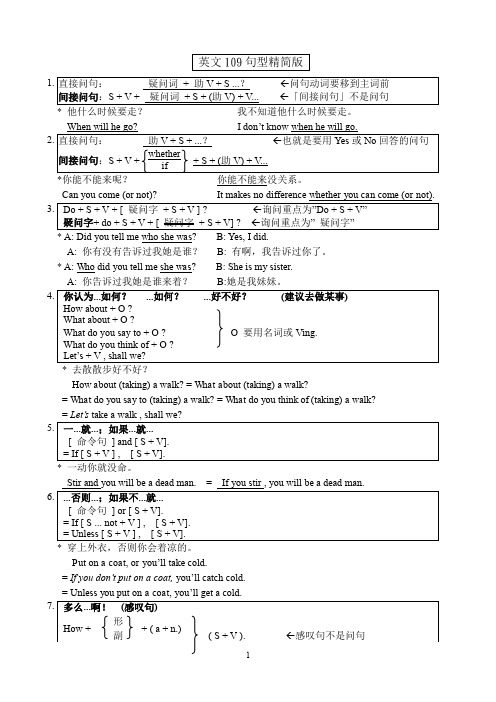
* 他什么时候要走?我不知道他什么时候要走。
*你能不能来呢?你能不能来没关系。
* A: Did you tell me who she was? B: Yes, I did.A: 你有没有告诉过我她是谁?B: 有啊,我告诉过你了。
* A: Who did you tell me she was? B: She is my sister.* 去散散步好不好?How about (taking) a walk? = What about (taking) a walk?= What do you say to (taking) a walk? = What do you think of (taking) a walk?* 一动你就没命。
* 穿上外衣,否则你会着凉的。
Put on a coat, or you’ll take cold.=If you don’t put on a coat, y ou’ll catch cold.* 多么美的夜色啊!* 这些男孩好丑啊!How beautiful a night (it is)! How ugly the boys are! = What a beautiful night (this is)! = What ugly boys (they are)!* 要是我现在有翅膀,我要飞到美国。
* 要是那时这鞋子我合穿的话,我就买了。
* 即使明天太阳从西边升上来,我也不会做这样的事。
*万一这次失败了,我会再试一次。
*如果明天天气好,我们就去野餐。
* 我要是一只鸟该多好。
I wish I were a bird.我真希望你那时告诉我真相就好了。
If only you had told me the truth.但愿明天我能跟你一起去就好了。
Would that I could go with you tomorrow.* I hope you can help me. 我希望你能帮我。
常用英语短句句型
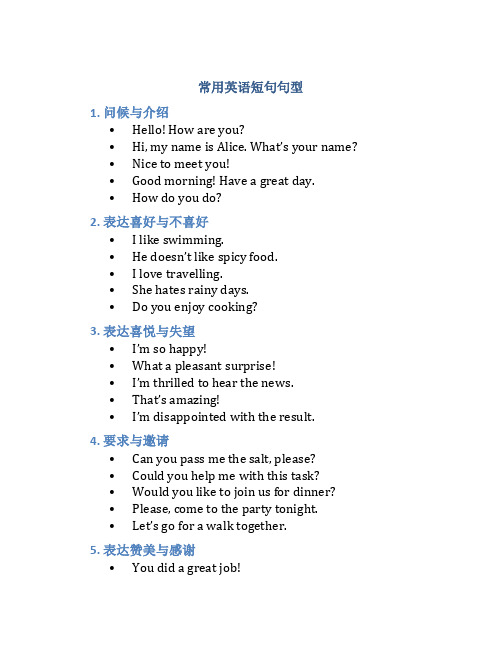
常用英语短句句型1. 问候与介绍•Hello! How are you?•Hi, my name is Alice. What’s your name?•Nice to meet you!•Good morning! Have a great day.•How do you do?2. 表达喜好与不喜好•I like swimming.•He doesn’t like spicy food.•I love travelling.•She hates rainy days.•Do you enjoy cooking?3. 表达喜悦与失望•I’m so happy!•What a pleasant surprise!•I’m thrilled to hear the news.•That’s amazing!•I’m disappointed with the result.4. 要求与邀请•Can you pass me the salt, please?•Could you help me with this task?•Would you like to join us for dinner?•Please, come to the party tonight.•Let’s go for a walk together.5. 表达赞美与感谢•You did a great job!•I admire your courage.•Thank you for your help.•I really appreciate your kindness.•You’re so talented!6. 描述喜怒哀乐•I’m excited about the upcoming trip.•He’s furious about the decision.•She’s sad because of the news.•They’re thrilled with the opportunity.•I’m worried about the test results.7. 提出建议与要求解释•You should see a doctor about the pain.•Why don’t you take a break and relax?•It might be a good idea to start early.•I suggest talking to him directly.•Let me explain the situation to you.8. 表达同意与不同意•I totally agree with your point of view.•I suppose you’re right about the situation.•I’m afraid I can’t go along with your plan.•I disagree with the decision made.•I can see where you’re coming from, but I have a different perspective.9. 确认事实与询问信息•Are you sure about the time of the meeting?•Is it true that they won the competition?•I heard you’re going on vacation, is that correct?•Can you confirm the flight details?•Do you know where the nearest post office is?10. 表达祝福与道别•Best wishes for your birthday!•I hope you have a wonderful day.•Good luck with your presentation!•Farewell and take care.•Have a safe journey ahead.以上是常用英语短句句型,希望对你的日常交流有所帮助。
实用英语口语句型+109大经典句
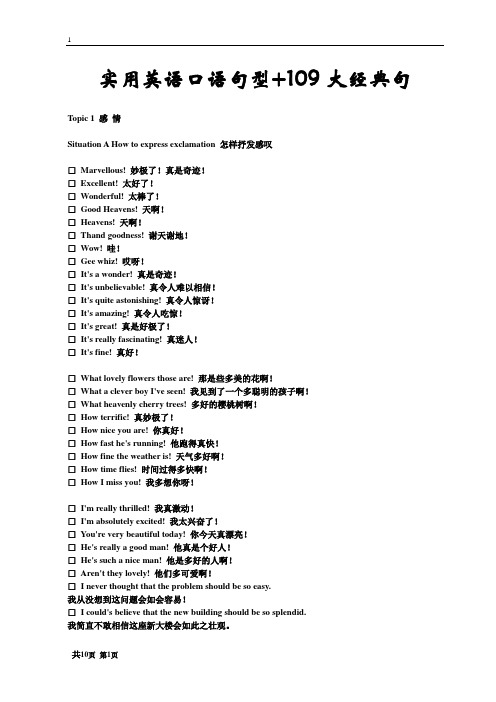
实用英语口语句型+109大经典句Topic 1 感情Situation A How to express exclamation 怎样抒发感叹□Marvellous! 妙极了!真是奇迹!□Excellent! 太好了!□Wonderful! 太棒了!□Good Heavens! 天啊!□Heavens! 天啊!□Thand goodness! 谢天谢地!□Wow! 哇!□Gee whiz! 哎呀!□It's a wonder! 真是奇迹!□It's unbelievable! 真令人难以相信!□It's quite astonishing! 真令人惊讶!□It's amazing! 真令人吃惊!□It's great! 真是好极了!□It's really fascinating! 真迷人!□It's fine! 真好!□What lovely flowers those are! 那是些多美的花啊!□What a clever boy I've seen! 我见到了一个多聪明的孩子啊!□What heavenly cherry trees! 多好的樱桃树啊!□How terrific! 真妙极了!□How nice you are! 你真好!□How fast he's running! 他跑得真快!□How fine the weather is! 天气多好啊!□How time flies! 时间过得多快啊!□How I miss you! 我多想你呀!□I'm really thrilled! 我真激动!□I'm absolutely excited! 我太兴奋了!□You're very beautiful today! 你今天真漂亮!□He's really a good man! 他真是个好人!□He's such a nice man! 他是多好的人啊!□Aren't they lovely! 他们多可爱啊!□I never thought that the problem should be so easy.我从没想到这问题会如会容易!□I could's believe that the new building should be so splendid.我简直不敢相信这座新大楼会如此之壮观。
100个英语句型
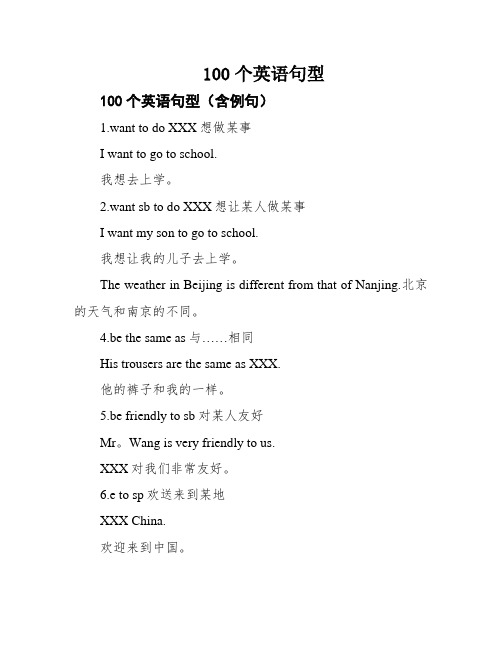
100个英语句型100个英语句型(含例句)1.want to do XXX想做某事I want to go to school.我想去上学。
2.want sb to do XXX想让某人做某事I want my son to go to school.我想让我的儿子去上学。
The weather in Beijing is different from that of Nanjing.北京的天气和南京的不同。
4.be the same as与……相同His trousers are the same as XXX.他的裤子和我的一样。
5.be friendly to sb对某人友好Mr。
Wang is very friendly to us.XXX对我们非常友好。
6.e to sp欢送来到某地XXX China.欢迎来到中国。
7.XXX?或人/某物出甚么弊端了?What’s the matter with your watch?你的手表怎么了?8.what to do做什么We don’t know what to do next.我们不晓得接下来要做甚么。
9.let sb do XXX让或人做某事Let him enter the room.让他进入房间。
10.let sb not do XXX让某人不做某事Let him not stand in the rain.让他不要站在雨中。
11.why don’t you do sth?你怎样不做某事呢?Why don’t you play football with us?你怎么不和我们踢足球呢?12.why not do sth?怎么不做某事呢?Why not play football with us?为甚么反面我们踢足球呢?13.make XXX为某人制造某物XXX.我爸爸给我做了一个风筝。
14.make sth for sb为或人制造某物XXX.我爸爸给我做了一个风筝。
英语万能句型100句
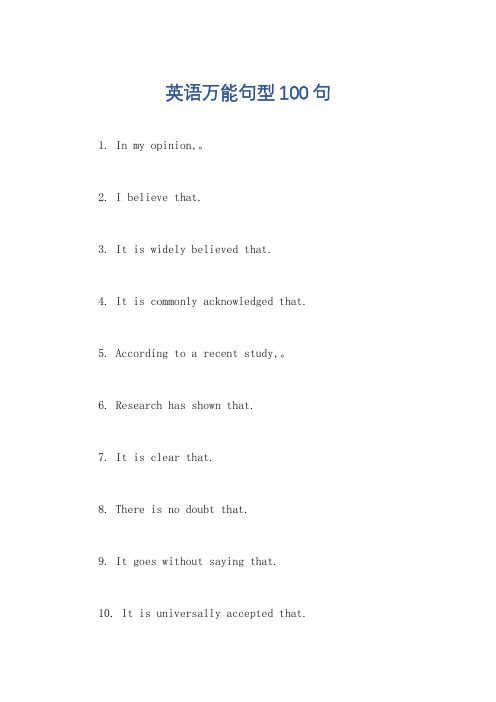
英语万能句型100句1. In my opinion,。
2. I believe that.3. It is widely believed that.4. It is commonly acknowledged that.5. According to a recent study,。
6. Research has shown that.7. It is clear that.8. There is no doubt that.9. It goes without saying that.10. It is universally accepted that.11. It is well-known that.12. It is generally agreed that.13. Many people claim that.14. It is often said that.15. Some people think that.16. It is often argued that.17. It is frequently reported that.18. It is widely recognized that.19. It is often suggested that.20. It is commonly thought that.21. It is generally considered that.22. It is widely believed that.23. It is commonly accepted that.24. It is frequently claimed that.25. It is often emphasized that.26. It is widely assumed that.27. It is generally thought that.28. It is widely acknowledged that.29. It is commonly known that.30. It is often pointed out that.31. It is often assumed that.32. It is commonly asserted that.33. It is widely reported that.34. It is generally recognized that.35. It is frequently argued that.36. It is widely believed that.37. It is commonly held that.38. It is often contended that.39. It is widely felt that.40. It is frequently stressed that.41. It is widely accepted that.42. It is generally agreed that.43. It is often mentioned that.44. It is widely regarded that.45. It is generally considered that.46. It is widely assumed that.47. It is commonly thought that.48. It is generally believed that.49. It is widely known that.50. It is frequently suggested that.51. It is often reported that.52. It is widely recognized that.53. It is generally acknowledged that.54. It is widely claimed that.55. It is commonly believed that.56. It is often said that.57. It is widely accepted that.58. It is generally thought that.59. It is often emphasized that.60. It is widely assumed that.61. It is commonly known that.62. It is generally recognized that.63. It is widely acknowledged that.64. It is commonly reported that.65. It is generally argued that.66. It is widely believed that.67. It is commonly held that.68. It is often contended that.69. It is widely felt that.70. It is frequently stressed that.71. It is widely accepted that.72. It is generally agreed that.73. It is often mentioned that.74. It is widely regarded that.75. It is generally considered that.76. It is widely assumed that.77. It is commonly thought that.78. It is generally believed that.79. It is widely known that.80. It is frequently suggested that.81. It is often reported that.82. It is widely recognized that.83. It is generally acknowledged that.84. It is widely claimed that.85. It is commonly believed that.86. It is often said that.87. It is widely accepted that.88. It is generally thought that.89. It is often emphasized that.90. It is widely assumed that.91. It is commonly known that.92. It is generally recognized that.93. It is widely acknowledged that.94. It is commonly reported that.95. It is generally argued that.96. It is widely believed that.97. It is commonly held that.98. It is often contended that.99. It is widely felt that.100. It is frequently stressed that.。
100句英语常用句型
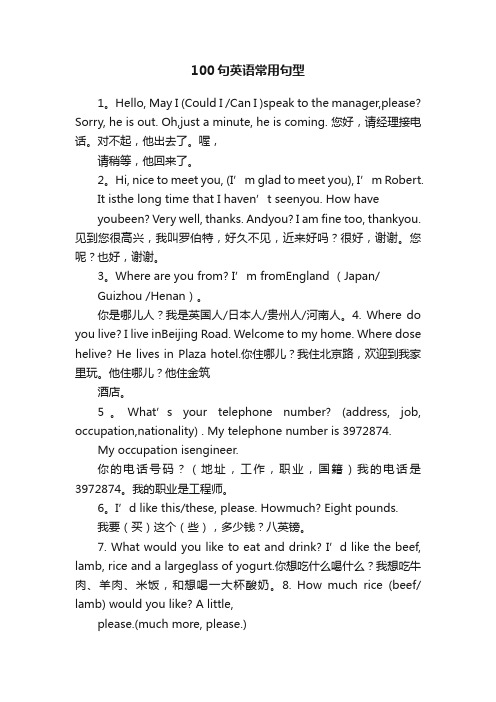
100句英语常用句型1。
Hello, May I (Could I /Can I )speak to the manager,please? Sorry, he is out. Oh,just a minute, he is coming. 您好,请经理接电话。
对不起,他出去了。
喔,请稍等,他回来了。
2。
Hi, nice to meet you, (I’m glad to meet you), I’m Robert.It isthe long time that I haven’t seenyou. How haveyoubeen? Very well, thanks. Andyou? I am fine too, thankyou. 见到您很高兴,我叫罗伯特,好久不见,近来好吗?很好,谢谢。
您呢?也好,谢谢。
3。
Where are you from? I’m fromEngland (Japan/Guizhou /Henan)。
你是哪儿人?我是英国人/日本人/贵州人/河南人。
4. Where do you live? I live inBeijing Road. Welcome to my home. Where dose helive? He lives in Plaza hotel.你住哪儿?我住北京路,欢迎到我家里玩。
他住哪儿?他住金筑酒店。
5。
What’s your telephone number? (address, job, occupation,nationality) . My telephone number is 3972874.My occupation isengineer.你的电话号码?(地址,工作,职业,国籍)我的电话是3972874。
我的职业是工程师。
6。
I’d like this/these, please. Howmuch? Eight pounds.我要(买)这个(些),多少钱?八英镑。
英语的万能句式大全
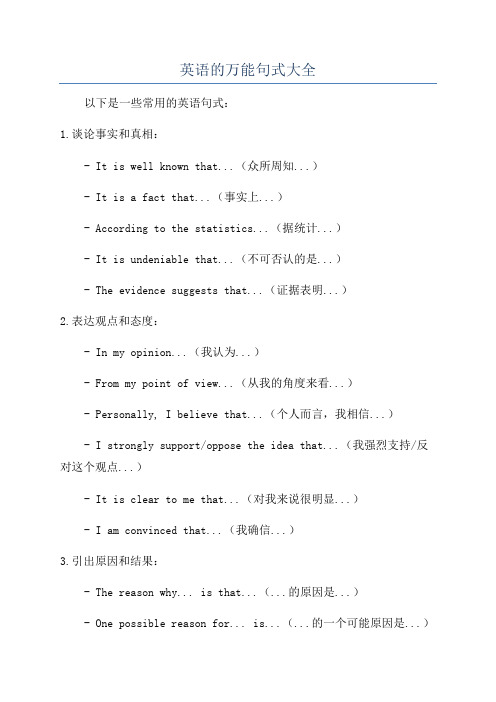
英语的万能句式大全以下是一些常用的英语句式:1.谈论事实和真相:- It is well known that...(众所周知...)- It is a fact that...(事实上...)- According to the statistics...(据统计...)- It is undeniable that...(不可否认的是...)- The evidence suggests that...(证据表明...)2.表达观点和态度:- In my opinion...(我认为...)- From my point of view...(从我的角度来看...)- Personally, I believe that...(个人而言,我相信...)- I strongly support/oppose the idea that...(我强烈支持/反对这个观点...)- It is clear to me that...(对我来说很明显...)- I am convinced that...(我确信...)3.引出原因和结果:- The reason why... is that...(...的原因是...)- One possible reason for... is...(...的一个可能原因是...)- As a result...(因此...)- Consequently...(因此...)- Therefore...(因此...)4.比较和对比:- Similarly...(同样地...)- Likewise...(同样地...)- On the other hand...(另一方面...)- In contrast...(相比之下...)- However...(然而...)5.提出建议和解决方案:- It would be advisable to...(建议...)- One possible solution is...(一个可能的解决方案是...)- It is essential to...(有必要...)- I suggest that...(我建议...)- To solve this problem, we could...(要解决这个问题,我们可以...)6.强调重要性:- It is crucial/vital/essential that...(非常重要的是...)- It is of great significance/importance that...(非常有意义的是...)- There is no doubt that...(毫无疑问的是...)- It cannot be stressed enough that...(再强调一遍...)7.提问和请求:- Could you please...?(请问你能...吗?)- Would you mind...?(你介意...吗?)- Can you tell me...?(你能告诉我...吗?)- Do you have any idea about...?(你对...有什么想法吗?)- I wonder if you could...(我想知道你能否...)8.表示同意和不同意:- I agree that...(我同意...)- I disagree that...(我不同意...)- I see your point, but...(我理解你的观点,但是...)- I can't help but disagree with...(我无法不和...不同意)- I'm afraid I have to disagree with...(恐怕我不得不和...不同意)。
一百个英语句型与短语

一百个超级短句
1.Absolutely not. 绝对不是。 2.Are you coming with me? 你跟我一起去吗? 3.Are you sure? 你能肯定吗? 4.As soon as possible. 尽快。 5.Believe me. 相信我。 6.Buy it . 买下来! 7.Call me tomorrow. 明天打电话给我。 8.Can you speak slowly? 请您说得慢些好吗? e with me. 跟我来。 10.Congratulations. 恭喜恭喜。 11.Do it right! 把它做对。 12.Do you mean it ? 你是当真的吗? 13.Do you see him often? 你经常见到他吗? 14.Do you see it? = Do you understand? 你明白了吗? 15.Do you want it? 你要吗? 16.Do you want something? 你想要些什么? 17.Don’t do it . 不要做。 18.Don’t exaggerate. 不要夸张。 19.Don’t tell me that. 不要告诉我。 20.Give me a hand . 帮我一下。 21.Go right ahead. 一直往前走。 22.Have a good trip. 祝旅途愉快。 23.Have a nice day. 祝你一天过得愉快。 24.Have you finished? 你做完了吗?
39.I found it . 我找到了。 40.I hope so . 我希望如此。 41.I knew it . 我早知道了。 42.I noticed that. 我注意到了。 43.I see. 我明白了。 44.I speak English well. 我英语说得很好。 45.I think so . 我认为是这样的。 46.I want to speak with him. 我想跟他说话。 47.I won. 我赢了。 48.I would like a cup of coffee, please. 请给我一杯咖啡。 49.I’m hungry. 我饿死了。 50.I’m leaving. 我要走了。 51.I’m sorry. 对不起。 52.I’m used to it . 我习惯了。 53.I’ll miss you. 我会想念你的。 54.I’ll try. 我试试看。 55.I’m bored. 我很无聊。 56.I’m busy. 我很忙。 57.I’m having fun. 我玩得很开心。 58.I’m ready. 我准备好了。
100句经典英语语法句型
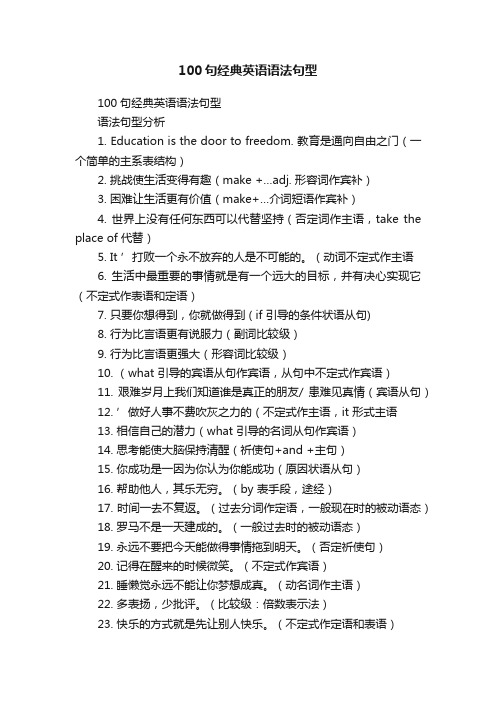
100句经典英语语法句型100句经典英语语法句型语法句型分析1. Education is the door to freedom. 教育是通向自由之门(一个简单的主系表结构)2. 挑战使生活变得有趣(make +…adj. 形容词作宾补)3. 困难让生活更有价值(make+…介词短语作宾补)4. 世界上没有任何东西可以代替坚持(否定词作主语,take the place of 代替)5. It ’打败一个永不放弃的人是不可能的。
(动词不定式作主语6. 生活中最重要的事情就是有一个远大的目标,并有决心实现它(不定式作表语和定语)7. 只要你想得到,你就做得到 ( if 引导的条件状语从句)8. 行为比言语更有说服力(副词比较级)9. 行为比言语更强大(形容词比较级)10. (what 引导的宾语从句作宾语,从句中不定式作宾语)11. 艰难岁月上我们知道谁是真正的朋友/ 患难见真情(宾语从句)12. ’做好人事不费吹灰之力的(不定式作主语,it 形式主语13. 相信自己的潜力(what 引导的名词从句作宾语)14. 思考能使大脑保持清醒(祈使句+and +主句)15. 你成功是一因为你认为你能成功(原因状语从句)16. 帮助他人,其乐无穷。
(by 表手段,途经)17. 时间一去不复返。
(过去分词作定语,一般现在时的被动语态)18. 罗马不是一天建成的。
(一般过去时的被动语态)19. 永远不要把今天能做得事情拖到明天。
(否定祈使句)20. 记得在醒来的时候微笑。
(不定式作宾语)21. 睡懒觉永远不能让你梦想成真。
(动名词作主语)22. 多表扬,少批评。
(比较级:倍数表示法)23. 快乐的方式就是先让别人快乐。
(不定式作定语和表语)24. 生命太短暂了,不要花在焦虑上。
(不定式否定,spend doing )25. 使我们痛苦的东西在真正锻造我们。
(主语从句)26. 没有要我们命的事情让我们更强大。
(主语从句)27. 伤害我们最深的对我们教育最深。
100个最重要的英语核心句型

100个最重要的英语核心句型1. welcome to sp 欢迎到某地Eg. Welcome to China.2. What’s the matter with sb./ sth? 出什么毛病了?Eg. What’s the matter with your watch?3. be different from 与......不同Eg. The weather in Beijing is different from that of Nanjing.4. be the same as 与……相同Eg. His trousers are the same as mine.5. be friendly to sb. 对某人友好Eg. Mr. Wang is very friendly to us.6. want to do sth. 想做某事Eg. I want to go to school.7. want sb. to do sth. 想让某人做某事Eg. I want my son to go to school.8. what to do 做什么Eg. We don’t know what to do next.9. let sb. do sth. 让某人做某事Eg. Let him enter the room.10. let sb. not do sth. 让某人不做某人Eg. Let him not stand in the rain.11. why don’t you do sth?怎么不做某事呢?Eg. Why don’t you play football with us?12. why not do sth.? 怎么不做某事呢?Eg. Why not play football with us?13. make sb. sth. 为某人制造某物Eg. My father made me a kite.14. make sth for sb. 为某人制造某物Eg. My father made a kite for me.15. What …mean by …? 做……是什么意思?Eg. What do you mean by doing that?16. like doing sth. 喜欢做某事Eg. Jim likes swimming.17. like to do sth. 喜欢做某事Eg. He doesn’t like to swim now.18. feel like doing sth. 想做某事Eg. I feel like eating bananas.19. would like to do sth. 愿意做某事Eg. Would you like to go rowing with me? 20. would like sb. to do sth. 愿意某人做某事Eg. I’d like you to stay with me tonight.21. make sb. do sth. 使某人做某事Eg. His brother often makes him stay in the sun.22. let sb. do sth. 让某人做某事Eg. Let me sing a song for you.23. have sb. do sth. 使某人做某事Eg. You shouldn’t have the students work so hard.24. be far from sp 离某地远Eg. His school is far from his home.25. be near to sp 离某地近Eg. The hospital is near to the post office.26. be good at sth./doing sth. 擅长某事/做某事Eg. We are good at English.They are good at boating.27. It takes sb. some time to do sth. 某人花多少时间做某事Eg. It took me more than a year to learn to draw a beautiful horse in five minutes.28. sb. spends some time/money (in )doing sth. 某人花多少时间做某事Eg. I spent twenty years in writing the novel.29. sb. spends some time/money on sth. 某事花了某人多少时间/金钱Eg. Jim spent 1000 yuan on the bike.30. sth. costs sb. some money. 某物花了某人多少钱Eg. The bike cost Jim 1000 yuan.31. sb. pays some money for sth. 某人为某物付了多少钱Eg. Jim paid 1000 yuan for the bike.32. begin/start with sth. 开始做某事Eg. The started the meeting with a song.33. be going to do sth. 打算做某事Eg. We are going to study in Japan.34. call A B 叫A BEg. They called the village Gumtree.35. thank sb. for sth./doing sth. 感谢某人做某事Eg. Thank you for your help.Thank you for helping me.36. What ……for? 为什么Eg. What do you learn English for?37. How/ what about doing sth.?做某事怎么样?Eg. How about going fishing?38. S +be+ the+最高级+of/in短语Eg. Lucy is the tallest in her class.39. S + be +比较级+than any other + n.Eg. Lucy is taller than any other student in her class.40. have to do sth. 不得不做某事Eg. I have to go home now.41. had better do sth. 最好做某事Eg. You’d better study hard at English.42. had better not do sth. 最好别做某事Eg. You’d better not stay up.43. help sb. to do sth. 帮助某人做某事Eg. Lucy often helps Lily to wash her clothes.44. help sb. do sth. 帮助某人做某事Eg. He usually helps me learn English.45. help sb. with sth. 帮助某人做某事Eg. I sometimes help my mother with the housework.46. make it +时间把时间定在几点Eg. Let’s make it 8:30.47. take sb. to sp 带某人到某地Eg. Mr. Wang will take us to the Summer Palace next Sunday.49. have nothing to do (with sb) 与某人没有关系Eg. That has nothing to do with me.50. 主语+ don’t think + 从句认为……不……Eg. I don’t think it will rain tomorrow.51. I t’s + adj.+ for sb. to do sth. 做某事对某人来说怎么样Eg. It is lucky for you to go to London.52. How + adj/ adv + 主+ 谓!多么……啊!Eg. How beautiful the flower is!53. what + a/an + adj + n + 主+ 谓!Eg. What an beautiful flower it is!54. What + adj+ pl./[u] +主+ 谓!Eg. What bad weather it is today!55. find it + adj+ to do sth. 发现做某事如何Eg. I find it hard to speak English well!56. ask sb. for sth. 向某人要某物Eg. They often ask me for money.57. need to do sth. 需要做某事Eg. You need to study hard.58. need sth 需要某物Eg. I don’t n eed your money.59. use A to do B 用A来做BEg. We use pens to write.60. show sb. sth 给某人看某物Eg. Please show me the map.61. show sth. to sb. 把某物给某人看Eg. Please show the map to me.62. pass sb. sth. 把某物递给某人Eg. Pass me the cup of tea.63. pass sth. to sb. 把某物递给某人Eg. Pass the cup of tea to me.64. buy sb. sth. 为某人买某物Eg. Mother bought me a bike.65. buy sth. for sb. 为某人买某物Eg. Mother bought a bike for me.66. give sb. sth 把某物给某人Eg. Jim gave me an English dictionary.67. give sth. to sb. 把某物给某人Eg. Jim gave an English dictionary to me.68. get to sp 达到某地Eg. I got to Beijing on the morning of May 1st.69. arrive at /in sp 达到某地Eg. I arrived in Beijing on the morning of May 1st.70. reach sp 到达某地Eg. I reached Beijing on the morning of May 1st.71. hope to do sth. 希望某人做某事Eg. I hope to see you soon.72. there is sth. wrong with sth./sb. 某物/某人出什么状况了Eg. There is something wrong my car.73. sth. is wrong with … 某物出什么毛病了Eg. Something is wrong with my car.74. How do you like sth? 你认为……怎么样?Eg. How do you like Beijing?75.What do you think of sth.? 你认为……怎么样?Eg. What do you think of Beijing?76. start doing sth. 开始做某事Eg. I started learning English in 1983.77. start to do sth. 开始做某事Eg. I started to watch TV after finishing my homework. 78.finish doing sth. 完成作某事Eg. I finished cleaning my car just now.79. enjoy doing sth. 喜欢做某事Eg. They all enjoy living and working in China.80.What / when / where / who / something / anything /nothing else …… 别的什么/何时/何地/谁……Eg. What else do you want to buy?Where else have you gone?Who else have you played with?I have nothing else to tell you.Would you like something else?81. forget doing sth. 忘记做过某事了(已做)Eg. I forgot turning off the lights. Look, it is dark in the room.82. forget to do sth. 忘了做某事了(未做)Eg. I forgot to turn off the lights. Could you go back and shut the off?83. remember doing sth. 记得做过某事了(已做)Eg. I remembered returning your money. You are so forgetful.84. remember to do sth. 记住去做某事(未做)Eg. Remember to bring me some money. I’ve run out of it.85.stop to do sth. 停下来去做某事Eg. He stopped to talk with Mary when she enter the office.86. stop doing sth. 停止做某事Eg. The students stopped talking when the teachet came in.87. watch/see/hear sb. do sth. 观看/看见/听见某人做了某事(全过程)Eg. I saw you pick an apple just now.88. watch/see/hear sb. doing sth. 观看/看见/听见某人正在做某事(点动作)Eg. I saw you playing basketball with your classmates on the playground last Sunday.89. go on doing sth. 继续作某事Eg. He went on reading after a short rest.90. go on to do sth. 继续作某事Eg. He went on to read after finishing wash the dishes.91. go on with sth. 继续某事Eg. He went on with his work after a short rest.92. say hello/goodbye to sb. 向某人告别Eg.I came to say good-bye to you.93. be busy doing sth. 忙于做某事Eg. They are busy planting trees on the hill.94. be interested in sth. 对某事感兴趣Eg. English is very interesting. We are all interested in it.95. tell sb. to do sth. 告诉某人做某事Eg. Mother told me to go shopping with her.96. ask sb. to do sth. 让某人做某事Eg. Jim ask me to go rowing with him.97. call/ring sb. up 给某人打电话Eg. I will call you up tommow.98. be ready to do sth. 准备做某事Eg. We are ready to have lunch.99. go doing sth. 去做某事Eg. Let’s go fishing.100. prefer A/doing A to B/doing B 比起A/做A,更喜欢B/做BEg. Lucy prefers English to French.I prefer staying at home to going to the cinema.[来源]北京数学压轴题.学习者在阅读。
英语口语万能句型100句
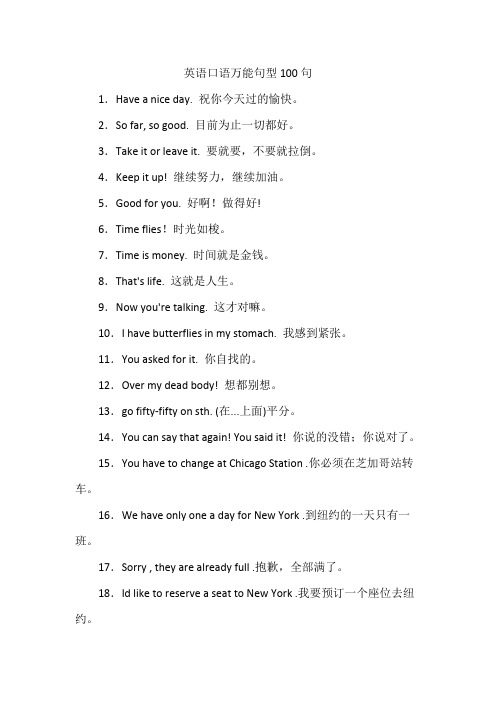
英语口语万能句型100句1.Have a nice day. 祝你今天过的愉快。
2.So far, so good. 目前为止一切都好。
3.Take it or leave it. 要就要,不要就拉倒。
4.Keep it up! 继续努力,继续加油。
5.Good for you. 好啊!做得好!6.Time flies!时光如梭。
7.Time is money. 时间就是金钱。
8.That's life. 这就是人生。
9.Now you're talking. 这才对嘛。
10.I have butterflies in my stomach. 我感到紧张。
11.You asked for it. 你自找的。
12.Over my dead body! 想都别想。
13.go fifty-fifty on sth. (在...上面)平分。
14.You can say that again! You said it! 你说的没错;你说对了。
15.You have to change at Chicago Station .你必须在芝加哥站转车。
16.We have only one a day for New York .到纽约的一天只有一班。
17.Sorry , they are already full .抱歉,全部满了。
18.Id like to reserve a seat to New York .我要预订一个座位去纽约。
19.Look who's talking! 看看你自己吧!20.It's Greek to me. 这我完全不懂。
21.take my word for it 相信我的话。
22.let the cat out of bag 泄露秘密。
23.sth. is touch-and-go 危险的情况;惊险的;一触即发的。
24.beat a dead horse 白费劲。
- 1、下载文档前请自行甄别文档内容的完整性,平台不提供额外的编辑、内容补充、找答案等附加服务。
- 2、"仅部分预览"的文档,不可在线预览部分如存在完整性等问题,可反馈申请退款(可完整预览的文档不适用该条件!)。
- 3、如文档侵犯您的权益,请联系客服反馈,我们会尽快为您处理(人工客服工作时间:9:00-18:30)。
老師的話:1. 精簡版適合: 任何程度有零碎時間的學生培養實力、 程度好考前衝刺的學生複習、●程度不好考前填鴨的學生抱佛腳。
2. 公式若看不清楚,可直接背例句。
3. 每個句型,至少要會寫一句。
4. 真正培養實力還是得靠原來完整版。
你能不能來沒關係。
* A: Did you tell me who she was? B: Yes, I did.A: 你有沒有告訴過我她是誰?B: 有啊,我告訴過你了。
* A: Who did you tell me she was? B: She is my sister.A: 你告訴過我她是誰來著?B:她是我妹妹。
How about (taking) a walk? = What about (taking) a walk?= What do you say to (taking) a walk? = What do you think of (taking) a walk?Stir and you will be a dead man. = If you stir , you will be a dead man.Put on a coat, or you’ll take cold.=If you don’t put on a coat, you’ll catch cold.How beautiful a night (it is)! How ugly the boys are!* 要是我現在有翅膀,我要飛到美國。
* 要是那時這鞋子我合穿的話,我就買了。
* 即使明天太陽從西邊升上來,我也不會做這樣的事。
*萬一這次失敗了,我會再試一次。
*如果明天天氣好,我們就去野餐。
I wish I were a bird.我真希望你那時告訴我真相就好了。
If only you had told me the truth.但願明天我能跟你一起去就好了。
Would that I could go with you tomorrow.* I hope you can help me. 我希望你能幫我。
←可能實現I wish you could help me. 要是你能幫我就好了。
←不可能實現Were we to fail, what would happen? (= If we were to fail, ...)要不是我早知道她的名字,當時我就糗了。
Had I not known her name, I would have been embarrassed. (If I had not known ...) 萬一下雨,我們就不去了。
But for the sun, we couldn’t live at all.= Without the sun, we couldn’t live at all.= If it were not for the sun, we couldn’t live at all.It is (high) time we went to bed.Her father insisted that she (should) marry that man.*此類V.如:suggest, order, demand, command, insist, propose, ...*其實只要有「命令」、「建議」、「要求」、「堅持」意味的字,不論是名詞、動詞、形容詞,其所接子句中的動詞都該用原形、或”should + 原形V”。
It is necessary that he take the exam.他必須參加考試不可。
= You can never be over careful in choosing friends.* 人不都誠實。
比較:* 人都不誠實。
All men are not honest. No man is honest.There is no one but loves his own child.= There is no one that does not love his own child.There is no telling what may happen.= There is no way of telling what may happen.* 我感興趣的不是化學,而是物理。
What I am interested in is not chemistry, but physics.He will be the last person to betray you.He failed to arrive in time. I never fail to keep my word. = He was unable to arrive in time. = I keep my word without fail.He has much money, but I have many books.= He has not a little money, but I have not a few books.= He has no little money, but I have no few books.= He has quite a little money, but I have quite a few books.It goes without saying that honesty is the best policy.I shall never forget the beautiful school days.= Never shall I forget the beautiful school days.他很少遲到。
我絕不會原諒他。
He is hardly late. I will forgive him by no means.We can succeed only by working hard.= Only by working hard can we succeed.The beggar waited at the gate. She sat behind the counter.= At the gate waited the beggar. = Behind the counterYou are young, and so am I. A: I hear you did a good job. B: So we did. = You are young, and I am, too.= A: I hear you did a good job. B: Yes, we did. * 否定「也不」倒裝要用neither。
如:You are not young, and I am not, either= You are not young, and neither am I. ←用neither後面不要再有notHe has bought as many clothes as has his wife.= He has bought as many clothes as his wife (has).我們的教務主任比校長能幹。
Our director of studies is more capable than is our principal.= Our director of studies is more capable than our principal is.* 我的英文進步很大所以父母很高興。
My progress in English was such that it pleased my parents.= My progress in English was such as to please my parents.= Such was my progress in English that it pleased my parents.= Such was my progress in English as to please my parents.= My progress in English was so great that it pleased my parents. = My progress in English was so great as to it please my parents. = So great was my progress in English that it pleased my parents.It is bad for health to keep indoors all day.is bad for health that one keeps indoors all day.I think it bad for health to keep indoors all day.= I think it bad for health that one keeps indoors all day.= I think (that)= I think (that)* 據說他從前很有錢。
People say that she was rich.= It is said that she was rich.* 我有一個做老師的叔叔。
* 我有一個我從未見過的叔叔。
I have an uncle, and he is a teacher. I have an uncle, and I have never seen him . = I have an uncle who is a teacher. = I have an uncle (whom) I have never seen. * 我有一個全家都在美國的叔叔。
I have an uncle, and his family are all in America= I have an uncle whosefamily are all in America.Those who have money do not want for friends.=Such as have money do not want for friends.=He who has money does not want for friends.=Whoever has money He was a foreigner, as I knew from his accent.= He was a foreigner, which I knew from his accent.= As I knew from his accent, he was a foreigner,In our class there is no one that does not hope to go to college.= In our class there is no one but hopes to go to college.讓孩子們讀點使他們更好、更聰明的書。
